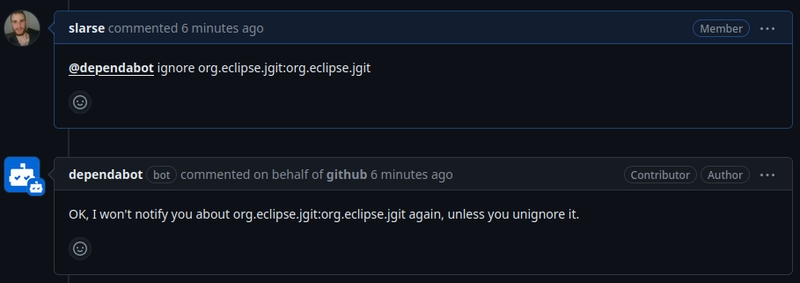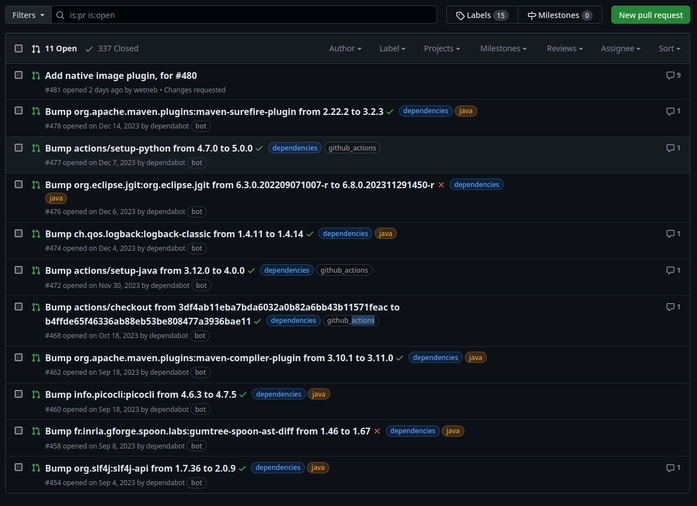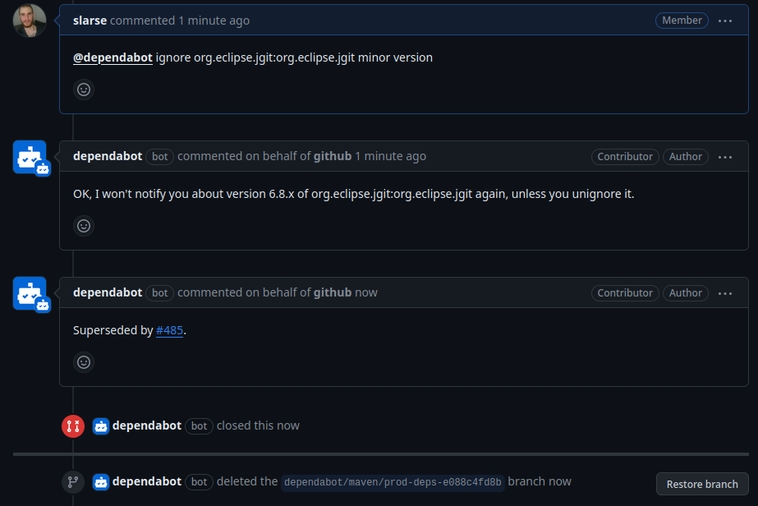Dependabot's dependency grouping is awesome
Posted by Simon Larsén in Programming

I've been using GitHub's Dependabot since it was released around 4 years ago, and to a large extent, it's been great. Except for one thing: the sheer amount of pull requests Dependabot would open for dependency updates. For some of my repositories it became more of a chore to keep up with Dependabot's pull request spamming than to just manually update dependencies every once in a while.
Well. Turns out that's been fixed.
Dependabot's big problem: Pull request spam
Since Dependabot was released, it's only mode of operation has been to open one pull request per dependency update. As you can imagine, that leads to a whole bunch of pull requests being opened. I would routinely get dozens of dependency pull requests a week for some of my more dependency heavy repositories. Needless to say, that's just not manageable.
One of my projects, Spork, which is mostly in maintenance mod is one such example where I just gave up on keeping up with the updates. It ended up looking like this:

What a mess. But there's light at the end of the tunnel.
The fix: Grouped dependencies
To address that problem GitHub recently released Grouped Version Updates as a feature for Dependabot. In short, this means that you can get Dependabot to open pull requests containing multiple dependency updates, grouped in three different ways.
A configuration example
For my project Spork, I decided to group dependencies in three groups:
- Updates to GitHub Actions dependencies
- Updates to production dependencies
- Updates to development dependencies
Configuring this was really straightforward, all it took was this commit.
directory: "/"
schedule:
interval: "daily"
+ groups:
+ actions-deps:
+ patterns:
+ - "*"
- package-ecosystem: "maven"
directory: "/"
schedule:
interval: "daily"
+ groups:
+ dev-deps:
+ dependency-type: "development"
+ prod-deps:
+ dependency-type: "production"
In full, the configuration looks like so.
version: 2
updates:
- package-ecosystem: "github-actions"
directory: "/"
schedule:
interval: "daily"
groups:
actions-deps:
patterns:
- "*"
- package-ecosystem: "maven"
directory: "/"
schedule:
interval: "daily"
groups:
dev-deps:
dependency-type: "development"
prod-deps:
dependency-type: "production"
For each package ecosystem, you must group on something. For
github-actions, I just wanted a single group, and the way to achieve such an
"everything group" is to simply use a wildcard pattern. For maven, I ended up
splitting by the dependency-type attribute instead, which can be either
development or production.
But that's just two ways to group, you said there were three ways? Very
attentive of you! In addition to the pattern and dependency-type groupings,
you can also group by update-type, which can be patch, minor or major
and only really works for dependencies that comply with Semantic
Versioning
Effects of the configuration
Within minutes, Dependabot had closed all* of the single dependency pull requests and created two new pull requests. One PR contained the GitHub Actions updates, which I could immediately merge.
*For reasons I don't quite get at this point, one single-dependency PR for
gumtree-spoon-ast-diffremained open

Note that the actions-deps name, which is one of the keys in the YAML config
file, ends up being written out in the pull request title. Another PR was opened
for the grouped production dependencies, but it did not pass CI.

This showcases the one downside with grouped dependency updates: there's no
indication as to which dependency caused the CI failure. If you scroll up to the
first image of this article, you'll similarly see the one benefit of single
dependency pull requests: the update for jgit is failing.
Note: As stated above,
gumtree-spoon-ast-diffwasn't included in the grouped dependency update for some reason, so we'll ignore that it's also failing.
So I decided to try to get Dependabot to open a new pull request without jgit.
Ignoring certain dependencies in a group
I knew that jgit was the issue in this case and decided to ignore it. It
seemed like ignoring minor version updates was the best path forward, so I
issued an @dependabot ignore <dependency_name> minor version command.

This didn't quite have the effect I was looking for, as Dependabot then
proceeded to
open a new pull request
with the previous minor version of jgit, which is also incompatible with
Spork. At this point I decided to bring out the big guns and ignore jgit
altoghether for now, as I knew I needed to put in some manual work to update it
anyway.

This finally resulted in what I wanted, a new PR without a bump to jgit that
does not break the build. Thus, it's ready to merge.

Of course, this comes with the caveat that I need to remember to unignore jgit
when I get around to updating it.
But I have 8 dependency updates with not too much effort, which is kind of cool!
Closing thoughts
I had somewhat given up on keeping dependencies up to date in my lesser loved projects. With grouped dependency updates, I feel like it will be possible for me to get back to keeping dependencies in good shape even for projects that I no longer actively work on.
The one downside is that it's no longer evident which dependency update breaks the build. However, over many years of maintaining projects built in various languages and technologies, experience tells me that it's way more common for dependencies to update just fine than for them to break something, so I think it's a tradeoff well worth taking. As patterns of which dependencies break the build more often start to become apparent, one can also refine the groupings and separate dependencies that break often from those that rarely or never do so.
To summarize, grouped dependency updates is a killer feature that makes Dependabot viable again. Everyone should use it, and it's honestly a shame that backwards compatibility demands makes it such that groups will probably never be the default.